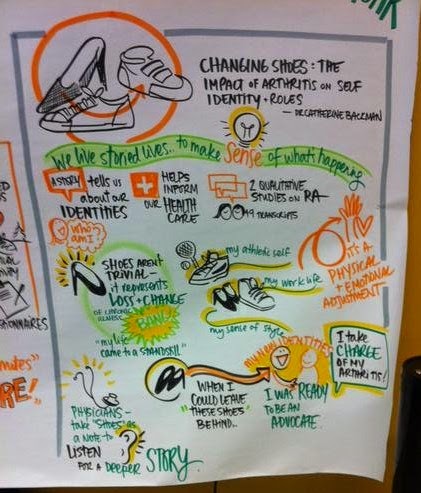Sam Bradd's graphic depiction of Dr. Backman's talk
Dr. Backman has done two studies about self identity and role changes, and said the most powerful example of the loss of self was the shoe metaphor. "We lead storied lives and the narratives and metaphors we use help us and others to make sense of our experiences."
"Changing shoes" represents not only a physical adjustment to accommodate pain, but also part of an internal process of reshaping identity. It is a very constant symbol of loss of professional self, stylish self, working self. Women eventually "gave up" their shoes and found a new sense of self or an identity no longer represented by the old shoes"
One of the contributors said that if you were more sedate and always wore granny shoes this issue may not turn your life around, but I don't know anyone under 50 who feels like that. When I went to a shoe store looking for style and comfort at the onset of arthritis, and they showed me the granny shoes I almost walked out (almost cried is actually more accurate). I ended up with green leather lace up boots and that helped.
These shoes are not cool. Will never buy shoes like these
Part of your life is gone, it's an internal process of reshaping identity symbolized by shoes.
. at : how can the experience of living with change how people view themselves?
Important to share stories of how people came to transition to new identity with @arthritis_UBC
"Flat shoes meant pants and never wearing dresses...my life became different...after a few years RA just wasn't getting better"
Experiencing - a transition story: Giving up steel-toed boots = giving up the job. Flat shoes = never wearing dresses ARC
Very true! : Shoes is a transition story, and it's not a transition people want.
For women: the type of shoe worn mirrors the life being lived> high powered work/ special occasions all accompanied by elegant shoes.
Metaphor of changing shoes represents many losses occurring as part of living with
Finding like minded people a big help. They're in mourning too for cool shoes
Past blog post of my own about shoes and life changes
huge adjustments to 'who I am' - suggests finding like-minded people via online groups/blogs could help
You all just gave me my next blog post idea. I have so many pretty shoes mourning in my closet! Along with outfits. My closet cries! @RareCandace
Oh how wonderful ~ life : turning lemons into lemonade
MT : I have arthritis & plan 2 hike again. worry re perception we get as person w/RA,stereotyped...
Reading your stories makes me glad I can still look like I'm in college, so flip flops, flats, boat shoes. I'm very "Miami"
“: MT Oh, ladies... this has been a HUGE thing for me. Would love to discuss. In a meeting right now though.
I spy a discussion about shoes. My inner fashion diva gushes. I had to give up heels after DX. Too dangerous/painful! @RareCandace
Putting old shoes away/giving to charity carries great meaning to 'Who I am' - transitioning to new identity with
Not always a bad news story, people find new shoes, new identity, new role, including advocate @maryadevera
Shoes are part of our foundation. Changing is difficult-who am I now?.
Dr Backman's research about Changing Shoes really resonated. Felt so much "less" at professional meetings in ugly shoes
Changing shoes...represent profound loss of sense of self in rheumatoid arthritis
Help seeking process. It's so hard to have to ask for help. It is part of identity change, along with shoes me
Yes, agree. My shoes are very ugly and it was (and still is) an issue though less now
Issue of shoes and arthritis: uh oh.... my issue :( have to wear low heel shoes,try to make stylish (gone are the stiletto days.. lol) @nxtstop1
What do shoes and family dinners have in common? Metaphors in rheumatoid arthritis patient experiences.
Implications of the research:
from Dr Backman's slide.
"Appreciating how seemingly small changes carry great meaning with regard to one's identity may foster more effective patient-provider communication and client centered practice.
Yes, shoes are a big deal to many! but more importantly, they represent some poignant losses that accompany chronic illness".
I can see this happening myself in some relatives. My mother in law just could not give up her impractical shoes after she became ill. I've had a long time to change my own life and adjust to what I still call ugly shoes. It can't be done overnight, and yet we were all very impatient when she stubbornly refused to change. Not many women want to wear "sensible shoes" and, as Preston pointed out later in the day, neither do men.

